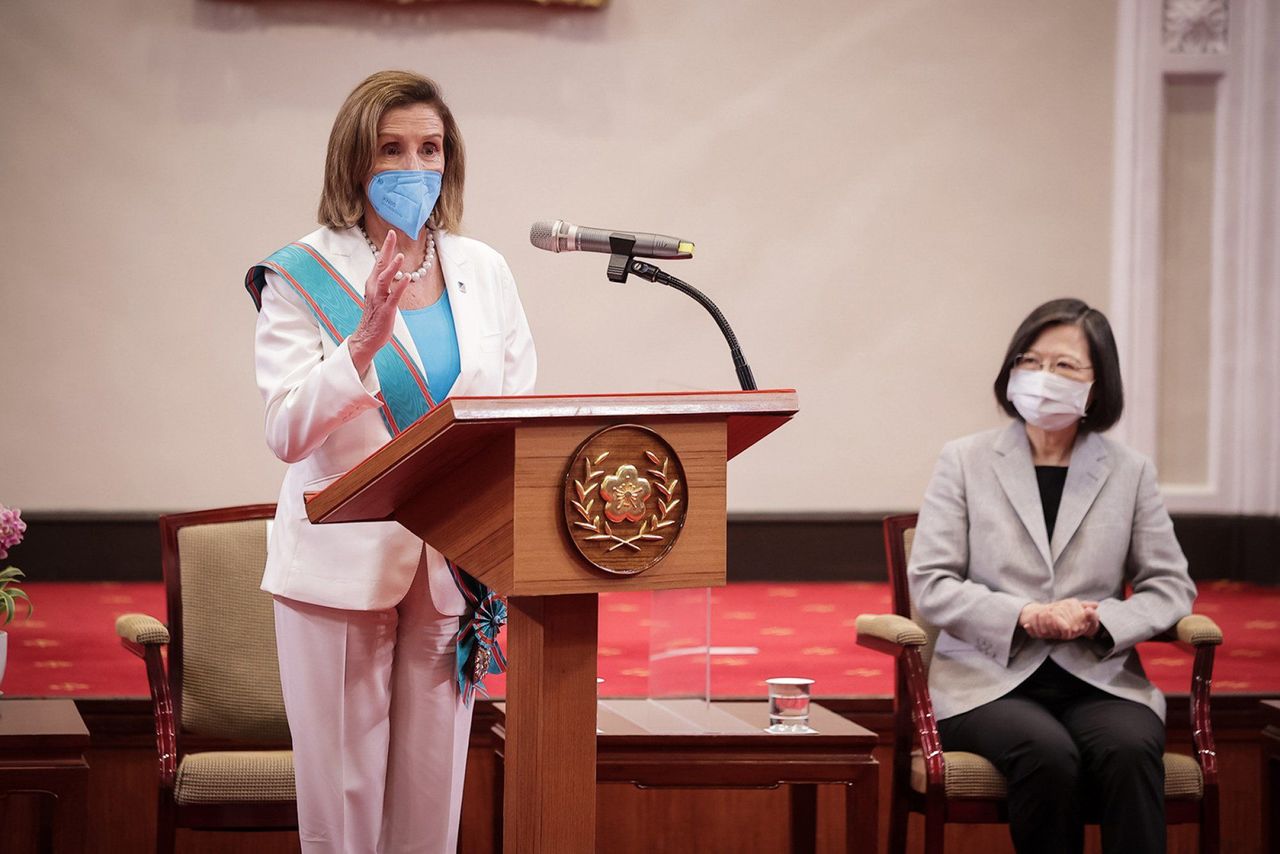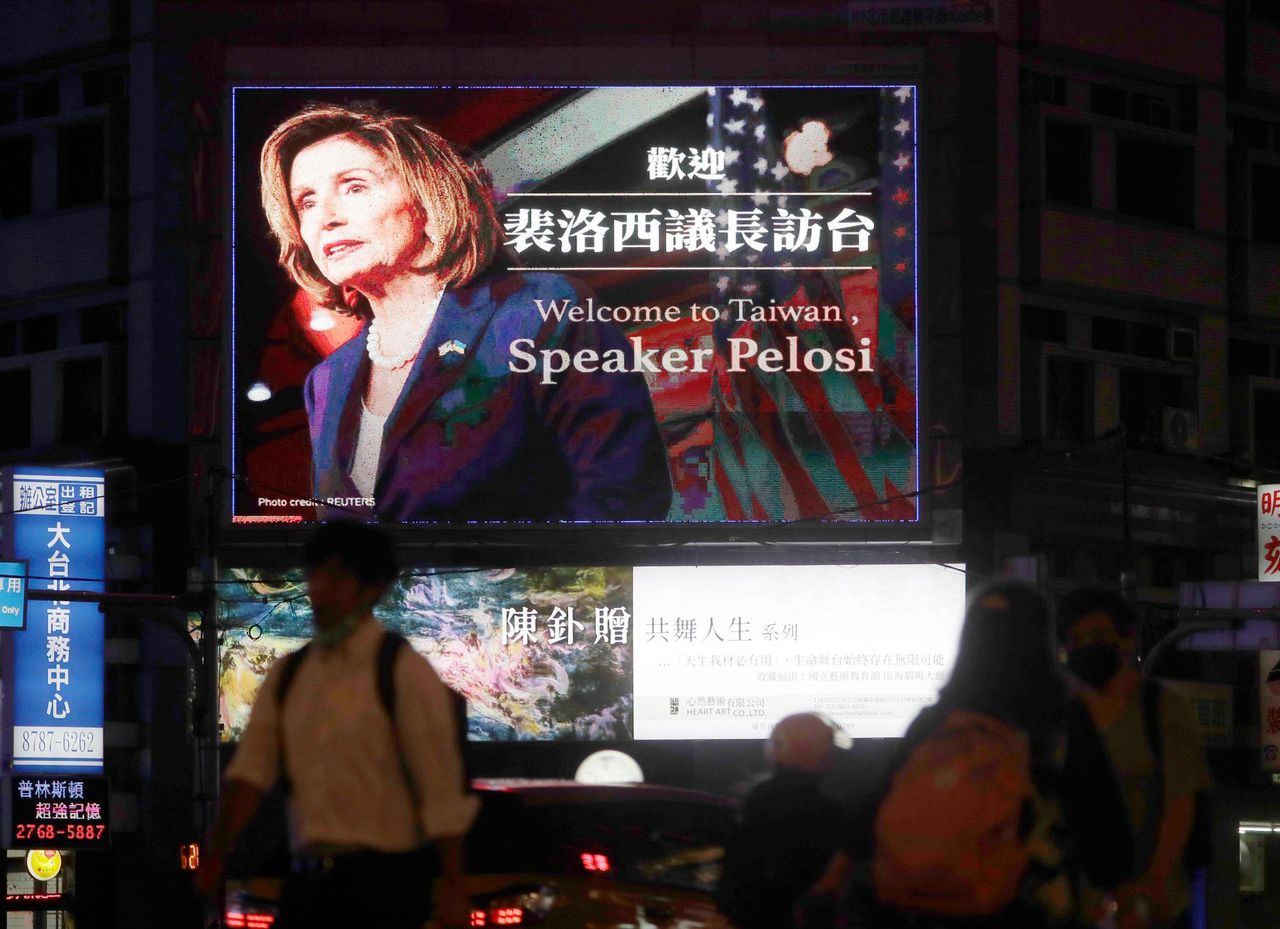‘There is no justification to use a visit as pretext for aggressive military activity in the Taiwan Strait’, say foreign ministers in joint statement.
The world’s most powerful democracies have slammed China for “increasing tensions and destabilising the region” over its response to US House Speaker Nancy Pelosi’s visit to Taiwan.
The G7’s top diplomats on Wednesday said they were “concerned by recent and announced threatening actions by the People’s Republic of China, particularly live-fire exercises and economic coercion, which risk unnecessary escalation”.
The joint statement came after Beijing’s announced plans for military drills in areas encircling Taiwan from Thursday to Sunday, with foreign airlines told to avoid these “danger zones”.
Beijing also banned more than 2,000 Taiwanese products from mainland China’s market following a whirlwind overnight visit by Pelosi, who is second in line to the US presidency, and a small group of lawmakers.
“There is no justification to use a visit as pretext for aggressive military activity in the Taiwan Strait. It is normal and routine for legislators from our countries to travel internationally,” read the statement from the foreign ministers of Canada, France, Germany, Italy, Japan, the UK, the US and the EU.
It urged China not to “unilaterally change the status quo by force in the region, and to resolve cross-strait differences by peaceful means”.
They also made clear there was “no change in the respective one-China policies, where applicable, and basic positions on Taiwan of the G7 members”.
Beijing has repeatedly accused Pelosi and the US of violating its own one-China principle, a policy in which China claims Taiwan, a self-governing island, as part of its territory.
“This move seriously violates the one-China principle, maliciously infringes on China’s sovereignty and blatantly engages in political provocations, which has aroused strong indignation among the Chinese people and widespread opposition from the international community,” said Foreign Minister Wang Yi on Wednesday.
However, while G7 members acknowledge Beijing’s claims to Taiwan, the one-China principle is not recognised as an internationally binding policy among the bloc.
China summoned US Ambassador Nicholas Burns late on Tuesday night and “lodged stern representations and strong protests” over the trip.
Chinese Vice-Foreign Minister Xie Feng told Burns that Pelosi’s visit, made as part of a whistle-stop tour of regional capitals, “has a severe impact on the political foundation of China-US relations, and seriously infringes on China’s sovereignty and territorial integrity”, official state media reported.
 US House Speaker Nancy Pelosi speaks after receiving Taiwan’s highest
civilian honour from Taiwanese President Tsai Ing-wen in Taipei on
Wednesday.
US House Speaker Nancy Pelosi speaks after receiving Taiwan’s highest
civilian honour from Taiwanese President Tsai Ing-wen in Taipei on
Wednesday.
Pelosi, accompanied by five US Congress members, boarded a US Air Force plane for South Korea late Wednesday afternoon for the fourth leg of her Asia tour.
Before leaving the island on Wednesday, the US House speaker tweeted: “Make no mistake: America remains unwavering in our commitment to the people of Taiwan – now & for decades to come.”
Defying repeated protests from Beijing, Pelosi held high-profile meetings with Taiwanese President Tsai Ing-wen, legislature deputy speaker Tsai Chi-chang, Vice-President William Lai and other senior officials.
The PLA’s Eastern Theatre Command conducted air and sea drills near the island beginning on Tuesday evening.
Representatives of Korean Air, ANA and Japan Airlines said they were re-routing some services to minimise the risk of encountering Chinese military drills, Bloomberg reported.
Xiamen Airlines has also made changes to flights, citing “flow control” in the mainland Chinese province of Fujian, which is opposite Taiwan.
Meanwhile, China stopped shipping sand to Taiwan, a move seen by some EU officials as a potential attempt to disrupt the semiconductor supply chain, which requires high-purity quartz sand.
Beijing also added citrus fruits and some seafood products to the list of Taiwanese goods banned from the mainland, citing pests and positive Covid-19 tests in the cold supply chain.
Speaking at a campaign event in northern England, UK Foreign Secretary Liz Truss, the front runner to replace Boris Johnson as Conservative Party leader and, therefore, British prime minister, said: “I do not support China’s inflammatory language on this issue.”
“It’s perfectly reasonable what is taking place and I urge China to de-escalate,” Truss added, according to The Guardian.
Lithuanian Foreign Minister Gabrielius Landsbergis, a champion of burgeoning ties between Vilnius and Taipei that have run afoul of Beijing, fuelled speculation that he could visit Taiwan with a tweet that strongly endorsed the trip.
“Now @SpeakerPelosi has opened the door to Taiwan much wider, I am sure other defenders of freedom and democracy will be walking through very soon,” he wrote. Lithuania plans to open a diplomatic presence in Taiwan next month.
Reinhard Butikofer, head of the European Parliament’s delegation on China, moved to quash speculation that lawmakers would be cowed from visiting Taiwan due to Beijing’s response.
“Parliamentary contacts with Taiwan have long been part of the political status quo. The EU and Germany cannot accept that China is shifting the red lines here. We define our one-China policy ourselves; we will not let Beijing dictate it to us … there will be more parliamentary visits in the future,” he said.
However, Lanxin Xiang, a Geneva-based research associate with the Belfer Centre of Harvard University, said Pelosi’s visit was “going to expedite the preparation for eventual overall military operation”.
“My sense is this will probably expedite at least in terms of military preparation,” Xiang said. “[Beijing] would not allow this to continue at such a fast speed moving towards what they considered independence.”
 People walk past a billboard welcoming US House Speaker Nancy Pelosi, in Taipei, Taiwan, on Tuesday.
People walk past a billboard welcoming US House Speaker Nancy Pelosi, in Taipei, Taiwan, on Tuesday.
As for Taiwan’s readiness, Bonnie Glaser, Asia director at the Washington-based German Marshall Fund, suggested the US supply additional training and technological support for the island’s territorial defence.
“We need to do more training with Taiwan,” Glaser told the US government’s leading advisory panel on China policy in Washington on Thursday. “But the question, of course, is how is the best way to do this?”
“Do you take units out of Taiwan, maybe train with them in Guam? Do you take them to Hawaii? Or do you do that training in Taiwan?”
Testifying before the US-China Economic and Security Review Commission, Glaser said the G7 statement represented “a first” in that it was “a statement focused on calling out China for its actions that it has taken surrounding Speaker Pelosi’s visit”.
“This really does underscore how much concern there is [among] our closest allies … Japan being number one on that list,” she added.
Sheena Greitens, an associate professor of public affairs at the University of Texas at Austin, agreed that the G7 statement showed an “increased willingness” in the bloc to counter Beijing.
Greitens believed the G7 statement reflected a desire “in part to try to head off or limit or reduce the risks” of a conflict in Taiwan.















